These are the pictures of Shanghai South Railway Station. I took it during the weekend, and as I promised, I posted here. I feel I am a journalist when I brought my camera to the South Railway Station – those staff must think I am a journalist – because no one went to a station that is not put in use yet.
Hope these pictures helps…
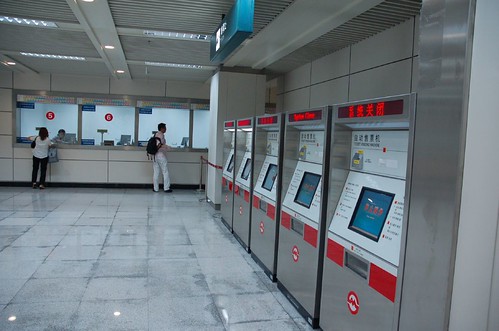
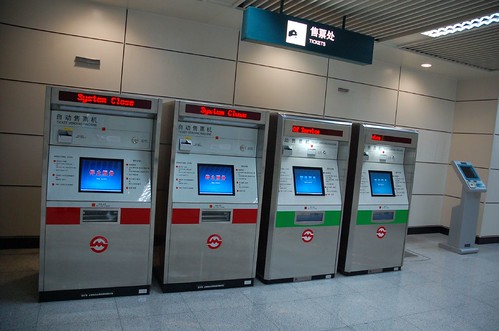
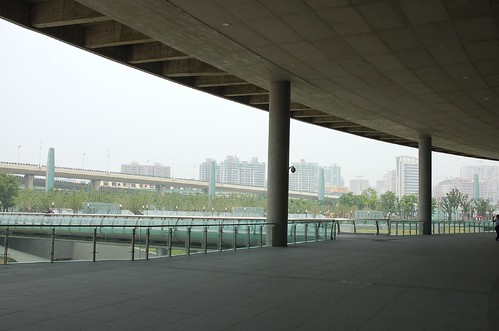
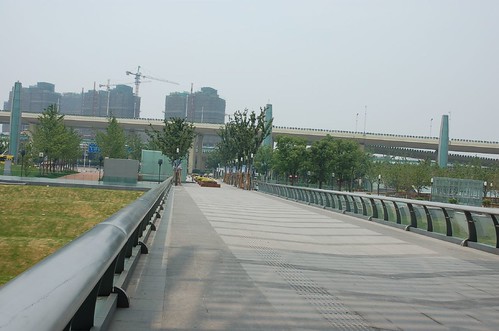
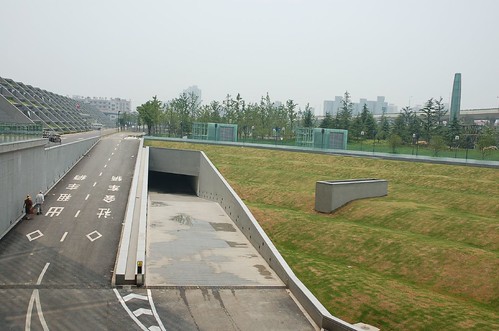
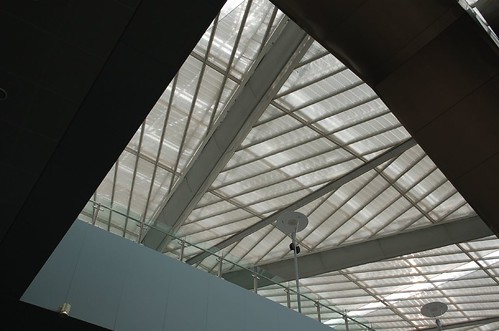
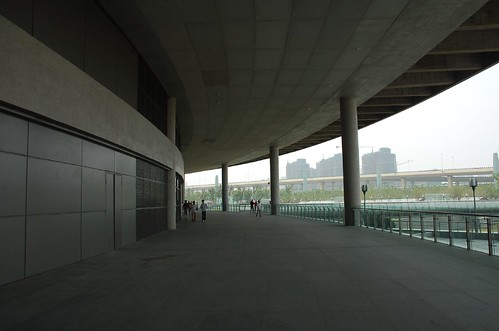
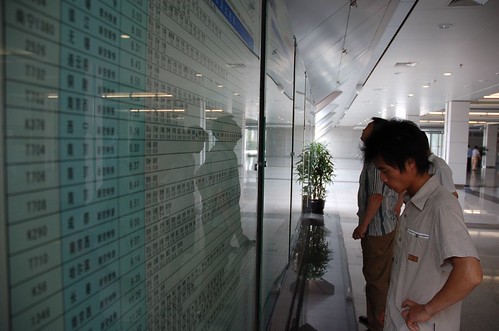
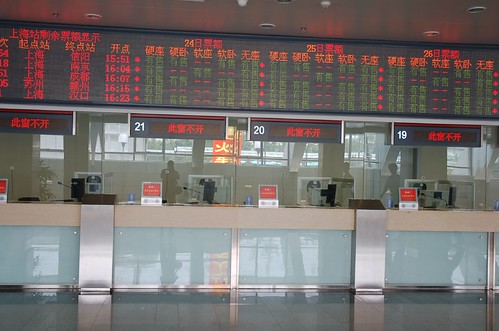
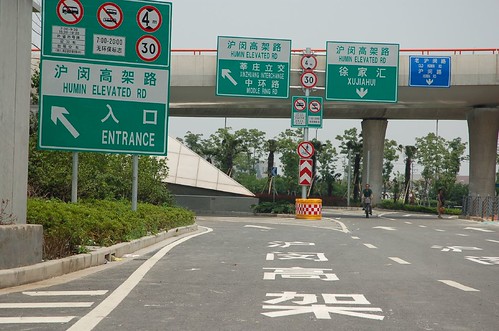
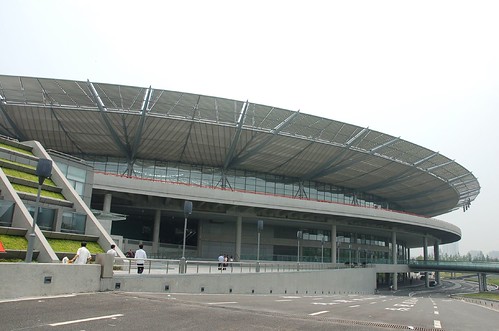
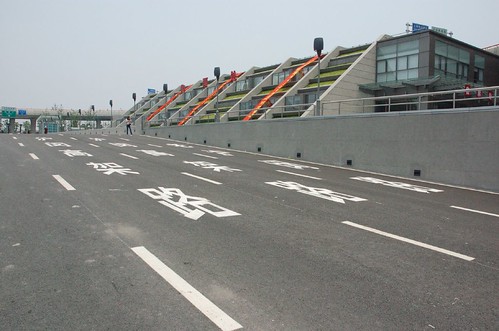
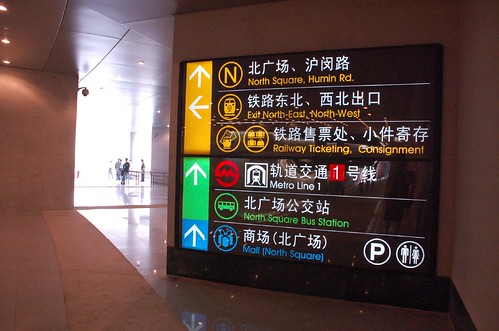
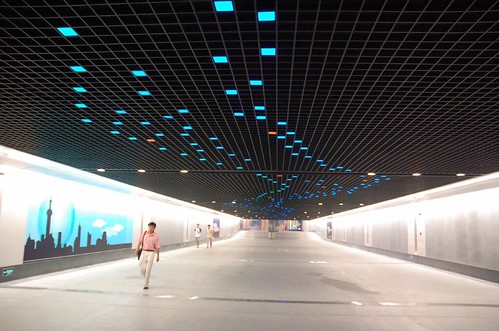
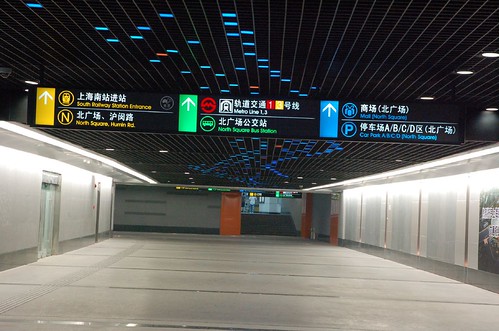
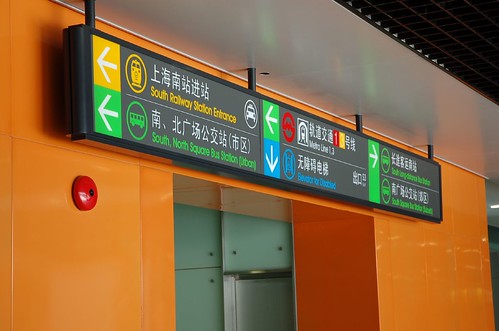
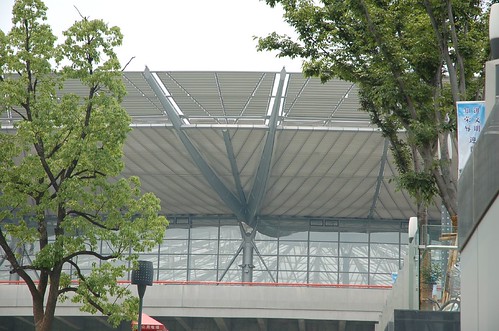
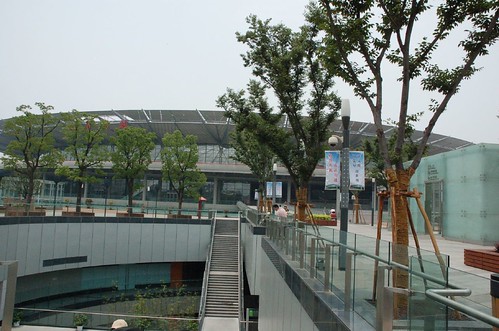
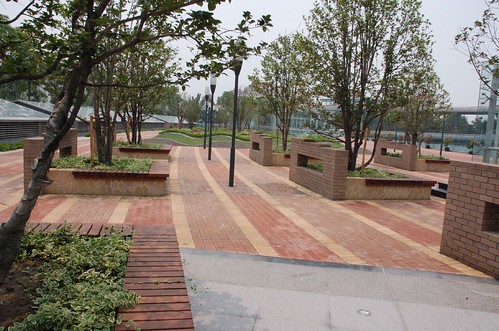
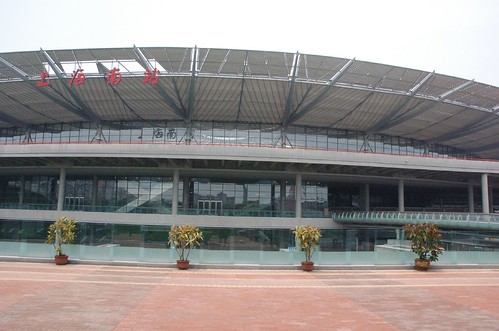

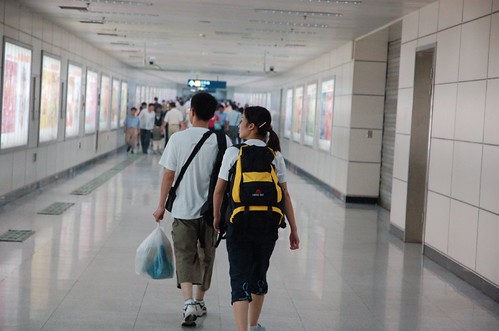
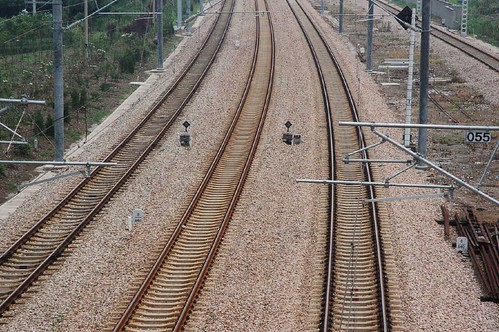
Bigger pictures can be found here.
Lovely to share those photos. Thanks, Kelly
I *love* the waves of grass. And the English signs seem to be translated correctly :)
Well, it will cost more to take care of the waved grass field then the smooth one. You can not operate big lawnmower on it. Maybe it is not that of a big field anyway.
How Much are tickets from Shanghai south station to Hangzhou? round trip/ one way?
i like the ceiling of the underground road
looks like the station still does not provide English translation on the electronic LED panel that inform platform no, check-in time and boarding time… sigh…
I am surprise HangZhou train station actually provide this information of the electronic panel but not in Shanghai station…
I guess Shanghai Station should look into this and improve to be a international standard station… let’s get prepare before all the international events get closer.
sorry jian suo if i keep push for the same topic, but i would like to understand what is the enviroment inpact of this new infrastracture, that for sure its great, nice, functional, but again is in a very high pollution alarm, situation is degenarating with over 70% of tap water sources are air situation is worst…
I live in SH, therefore as i have to be here and happy to be here, i really wonder if we may expose more the real enviroment situation in order to help increase the people understanding of the situation and everybody being concern will help to improve the present situation
anyway thxs for ur great job as always…
cheers
They are beautiful pictures, thank you for sharing them. I also like the waves of grass, and the brick garden with places for people to sit and enjoy the outdoors. You will hardly ever see such a thing at a train station here in the States — I think perhaps authorities would not see the point, or would be too fearful that the space would soon fill with homeless people and become a nuisance. What kind of people in Shanghai will use the park spaces?
ILH, the track on the lawn clearly indicates machine mowed, nevertheless, to service such stylish landscape, the lawnmower operator may suffer from motion sickness.
micah, reading the directional board, the term ‘consignment’ is usually referring to the delivery of parcel to a consignee of afar, while interpreting the chinese wording, would it be appropriate to read ‘left luggage’ or ‘baggage storage’. Any comment?
jerry, don’t worry. I will talk about the topic about polution soon. If I didn’t, feel free to keep “pushing”. :-)
I also like the wave – it is placed around the station. The environment is much better, and the tolerance of people for “good” environment is better and better. The mis-used word “Tolerance” here means, the ability to keep the environment as good as it was built.
“Motion sickness” You are pretty funny stephen. I noticed that one section of the waved lawn are in drought, But another section are still lash green. Did the landscaper forget lay in the sprinklers in some sections?
Yes, it is clearly lack of water, I think it is wrong mix of top soil, i.e. too much sand and drain away water.
I’m going to make a prediction. One year from now, the perfectly formed waved-lawn will no longer perfect. Speaking with experience, the freshly mounted/formed soil will set and packed overtime. The costly repairs will follow. That is why people do not rush into completing the their lawns when a new house is built. Are you with on this stephen?
Jian Shuo, you can take an another picture a year from now. We can make a comparison to prove my prediction.
I think that it depends on how the lawn mounds were detailed and finished – I doubt that it will settle too much. It is more than likely that it will be the ‘maintenance’ crew – usually untrained who have little idea how to maintain a lawn will end up balding the tops by mowing too low.
As for the lawn sections in drought I think that is just part of the establishment (takes 6-8 weeks sometimes longer as it is summer) it would probably more water efficient to use subterrain irrigation in a lawn such as this.
Hi Jian Shuo Wang,
Another somewhat off-topic post on big issues I guess, but just wanted to repost a couple paragraphs from an earlier discussion you all were having on smart economic/social/immigration policies for China. One of the suggestions that the retail businessman guy Pete mentioned in his post, really caught my attention as a Sinophilic French-Canadian currently working in Vancouver :) — the idea of China carefully and selectively inviting in skilled immigrants in areas like computer science, nursing, medicine, engineering and agriculture, especially from nearby Asian countries like the Philippines, Vietnam, South Korea, Thailand and Laos.
This strikes me as an incredibly clever idea, since it would bring in small numbers of immigrants from Asia to China, who would nonetheless be very high-skilled, high-quality and able to contribute enormously to the economy of China and Asia in general.
I’ll just repost my earlier brief post here, since I think it would make an excellent independent topic of discussion for your blog, if you wanted to make it a separate blog topic of its own. Here’s my original posting on this subject:
There’s a very unique idea that Pete mentioned which I found to be brilliant, and I hope that the Chinese authorities are listening because this is the key to China advancing economically and scientifically– China really should carefully, methodically open up its doors to work and residency permits for a controlled number of ***SKILLED IMMIGRANTS***, especially from other East Asian countries such as Vietnam, the Philippines and Thailand but also from the West. The keyword here is *skilled*, not unskilled. It’s the advantage in attracting skilled workers, that has enabled Europe and the US to continue to grow economically even as they suffer from their own worsening social problems at home.
My uncle’s home country of France, for example, is rapidly becoming a world intellectual center again– along with Germany– since France has recently been modifying its laws to selectively allow in skilled immigrants and computer workers from countries such as the Philippines, India, Vietnam (a former French colony), South Korea, Brazil, Romania, Bulgaria and Russia. Business owners, scientists, and other creative and productive people are also offered incentives to come to France, or to Germany. As a result, these two countries are turning their economies around and growing again.
China can help itself in a similar way and even begin to lead in industries like computer software (or create new industries entirely), by becoming a magnet for high-quality, educated and skilled immigrants in several important fields– an attraction for technical workers, scientists, artists and creative people from other countries, especially others in East Asia that share cultural ties with China. For example, the Philippines is a potential wonderful source of skilled workers for China, and could help to build valuable ties with the Chinese economy. The Philippines has millions of skilled nurses, doctors, engineers, entrepreneurs, artists and architects who would love to work in China and build up trans-national ties with China (facilitated by geographical proximity). Similar situation for Vietnam, and for South Korea, Thailand and Laos. Offer work and salary incentives to get a work permit and generate new businesses in China or work in technically difficult jobs, allow the skilled workers to bring in immediate family, even open up citizenship if they really contribute.
To build up its economy from the inside, China will need at least a share of the best talent from the outside, and offering incentives for skilled, creative and entrepreneurial workers from nearby Asian countries to immigrate to China is one excellent way to do that. As such talent is imported, Chinese industries will take off. They should also help to attract additional talent among the overseas Chinese diaspora, as Pete was suggesting.
Just another question with regards to skilled migration that is being suggested
1. Does china regconise foreign degrees?
2. what are the foreign institutions regconised in china?
3. Many countries dont regconise chinese degrees even if they are distinguished individuals in their field of expertise, will china do tit-for-tat when people from these countries go over to china: ie. not regconise a degree from Australia or USA?
One of the things I love about China is that so many of the signs are in Chinese and English. Makes it great for the foreign traveler!
The pictures are so great to show the changes of Shanghai.
Nice shots, Jianshuo !
If you go in the Ferris wheel, you can have a shot of the roof structure from above…
All aluminium structure, 278 meters across, made by adding bars onto a huge center pole, and then, when finished, the pole is removed, and the structure is free carrying.
It was amazing to follow the construction when I worked in Minhang
and passed by every day.
The wavy grass fields are cut by hand, of course !
Gardening workers are extremely low paid in China, so don’t worry.
They’ll do it monday to sunday, no weekends…
Oops, some Chinese passengers have their own alternative ways to use or abuse the South Railway Station:
http://www.news.zj.com/csj/shxw/2006-07-10/628432.html
For those who do not read Chinese, basically, they loitered in the lobby at night in hundreds, clogged all 132 toilets (German-made), destroyed some censor-activated faucets – all happened during the first 3 days of operation. Someone even steal away bathroom paper roll.(The lesson learned here: even German quality is not Chinese-proof!)
Something you’ll never learn from this Chinese ‘blogger’.
Oops, somebody called “Bellevue” has his own alternative ways to “use” or abuse the internet and harass others:
http://blog.bcchinese.net/bingfeng/archive/2005/01/07/7041.aspx
For those who do not read Chinese, basically, Bellevue sent hate mails and nasty comments to BingFeng teahouse, cursing Bingfeng’s family to die out and call his wife a pr*stitute, the smearing campaign has been proceeded by Bellevue for one and half year and most of the comments sent by Bellevue have been recorded by Bingfeng in the “Little green book” thread.
(The lesson learned here: even a Carlifornia-based “journalist” working in the famous Chinese-language newspaper “World Journal” could become a nasty troll)
Something you’ll never learn from Bellevue’s seemingly “civil” appearance here.
nice photos.. makes me wan to go there immediately……planning to visit shanghai by end of this year…